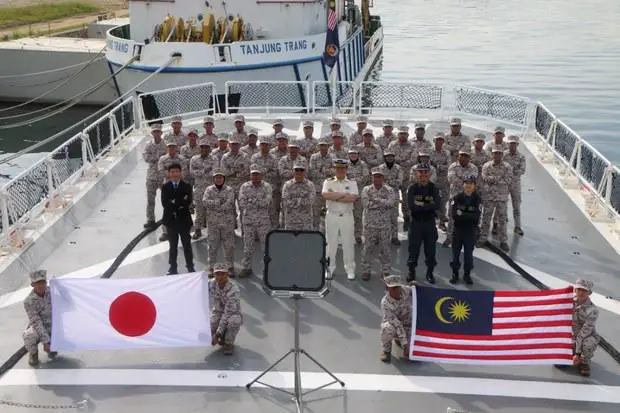The Japan Coast Guard on Friday concluded security drills to train its Malaysian counterpart on how to repel foreign intruders in the disputed South China Sea where Beijing has grown increasingly assertive against other claimant states. They are an upgrade from the devices used in Malaysia. Long-range acoustic devices are specialized loudspeakers that can produce sounds at high power to communicate across vast distances. The Japanese government contributed four of the sound cannons to Malaysia. The devices will be mounted on maritime agency’s offshore patrol boats
“The drill was conducted to train the officers and members on how to use the device and also to test its effectiveness against foreign ships, especially the ones that intrude into the country’s waters. It is to be used to chase away intruder ships that refuse to cooperate or the ones that are acting aggressively toward us,” Saiful Lizan Ibrahim, Malaysian Maritime Enforcement Agency’s deputy director of logistics said in a statement.
Chinese coast guard and navy ships intruded into Malaysian waters in the South China Sea 89 times between 2016 and 2019. Those ships remained in the region until they were turned away by the Malaysian navy. Indonesia, Vietnam and Malaysia have accused China of disrupting their oil and gas exploration activities with frequent incursions by Chinese coast guard and maritime militia ships, leading to confrontations and incidents. Like with Malaysia, Japan is also enhancing ties with South China Sea claimants, the Philippines and Indonesia. Unlike Malaysia, Japan is not a direct party to the South China Sea dispute with China, but is an interested stakeholder.
Japan is locked in its own dispute with China in the East China Sea, particularly over the Senkaku Islands. As for the South China Sea, Beijing claims almost all of it, including waters within the exclusive economic zones of Brunei, Malaysia, the Philippines, Vietnam and Taiwan. While Indonesia does not regard itself as a party to the dispute, Beijing claims historic rights to parts of the sea overlapping Indonesia’s EEZ as well. Meanwhile, Beijing has ignored a 2016 international arbitration court ruling won by Manila that invalidated China’s vast claims in the South China Sea.
















